Transforming Tanzania's Education Landscape
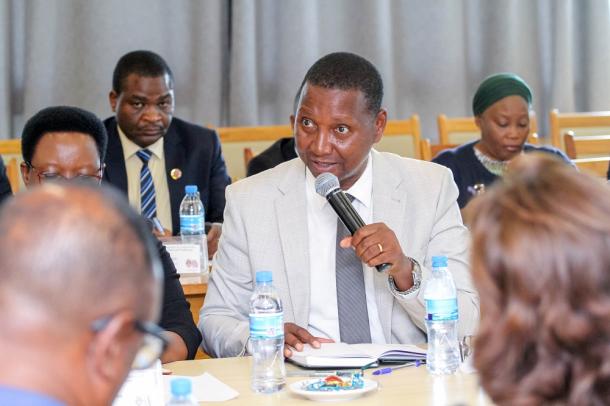
On November 24, 2023, a significant meeting transpired between the Heads of Agencies and Cooperations of the Education Development Partners Group (EdDPG) in Tanzania Mainland and the esteemed Hon. Prof. Adolf Mkenda, Minister for Education, Science and Technology, alongside high-level officials from the Ministry. The primary focus of this gathering was to address pivotal issues concerning the ongoing reform of the Education Sector in Tanzania Mainland. Since September 2022 UNESCO assumed the chairmanship of the EdDPG, a group of multilateral and bilateral agencies providing support to the Education Sector in Tanzania Mainland and Zanzibar. Established in 2001, the primary objective of the EdDPG is to facilitate coordinated interventions and policy dialogue among development partners, aiming to support the Tanzania Education Sector in achieving learning outcomes aligned with the Sustainable Development Goals.
During his address, Prof. Mkenda conveyed his deep appreciation to the Heads of Agencies and Cooperation for their proactive involvement in education reforms, underscoring his unwavering commitment to enhancing the education landscape in Tanzania. He approved the 2023 version of the National 2014 Education and Training Policy, providing insights into the new education structure and curriculum. Prof. Mkenda highlighted the critical challenge of insufficient teachers, emphasizing the need for collaborative efforts to overcome this hurdle in implementing the approved policy. He called for sustained cooperation to ensure increased access to and quality education, leaving no one behind in pursuing educational excellence. UNESCO, UNICEF, SIDA, UNHCR, World Bank, IMF, Belgium Embassy, USAID, KOICA, the Swiss Agency for Development, FCD, Aga Khan Foundation, DVV International, and other Education Development Partners Group members attended the meeting.
On the other hand, the WFP Country Representative in Tanzania, Ms. Sarah Gordon-Gibson, representing the UN Resident Coordinator, emphasized that the UN family in Tanzania stands in solidarity with the Government of the United Republic of Tanzania. This shared commitment is rooted in the United Nations Sustainable Development Cooperation Framework (UNSDCF) 2022-2027, reflecting a joint dedication to transforming the Education Sector.
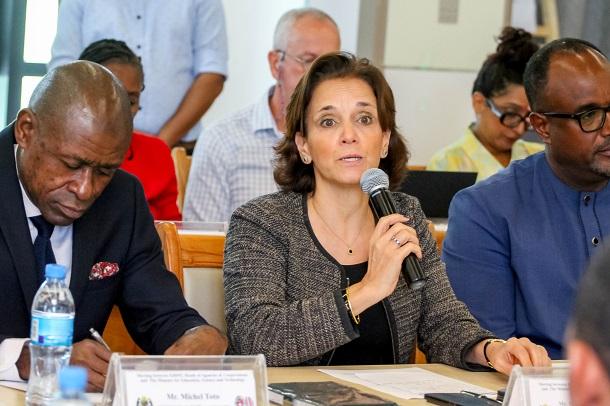
The UN family in Tanzania stands in solidarity with the Government of the United Republic of Tanzania in our shared commitment to transforming the education sector. This commitment is firmly rooted in the UNSDCF 2022-2027, launched by Vice President Phillip Mpango last year, that outlines our collective response to contribute more efficiently and effectively to achieve the 2030 Agenda for Sustainable Development in Tanzania.
Mr. Michel Toto, Head of Office and Country Representative of UNESCO, and the Chair of the EdDPG, acknowledged the Government's positive strides in budget allocation for the education sector over the past few years on behalf of the EdDPG. He reiterated the need to increase the education budget from 18% to the recommended rate of 20% to accelerate improvements in education sector outcomes. Mr. Toto reaffirmed the Education Development Partners Group’s commitment to support Tanzania’s Education Sector reform and development. Furthermore, he highlighted UNESCO's available support through its specialized institutes including the International Institute for Educational Planning (IIEP), the UNESCO Institute for Statistics (UIS), the International Bureau of Education (IBE), and the International Institute for Capacity Building in Africa (IICBA).
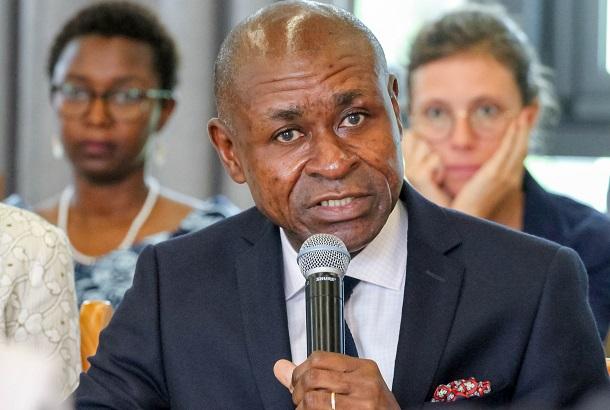
We commend the Government's efforts in improving and increasing access to the quality of education at all levels. Globally, we are halfway through implementing Sustainable Development Goal 4 on Education, which seeks to ensure sustainable, inclusive, and equitable quality education, promoting lifelong learning opportunities for all. This goal is at the core of our collective mission.
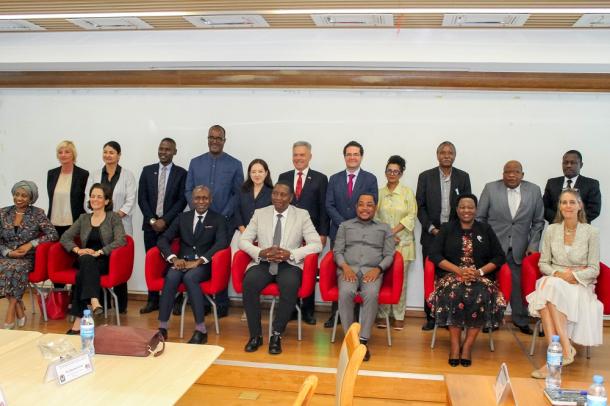
Participants in group photo during the meeting with the Honourable Minister of Education, Science and Technology

Related items
- Priority Africa
- Country page: United Republic of Tanzania
- Region: Africa
- UNESCO Office in Dar es Salaam
- SDG: SDG 4 - Ensure inclusive and equitable quality education and promote lifelong learning opportunities for all
- See more add
This article is related to the United Nation’s Sustainable Development Goals .

Other recent news

Academia.edu no longer supports Internet Explorer.
To browse Academia.edu and the wider internet faster and more securely, please take a few seconds to upgrade your browser .
Enter the email address you signed up with and we'll email you a reset link.
- We're Hiring!
- Help Center

CURRENT TRENDS IN EDUCATION REFORM IN TANZANIA

The paper attempted to study the Current Trends of Education Reform in Tanzania. The purpose of the study was to find out the current trends and reform of Education in Tanzania. The problem statement is about the current trends of education reform in Tanzania. Since the Ujamaa Philosophy, and its pertinent Education for Self Reliance Policy impacted so much in all aspects of development; political, economic, social, health, education etc for half a century, the hypothesis is: The historical background of education in Tanzania is strongly based on the legacy of Mwalimu Nyerere's philosophy of education and policy, are the current trends in education reform in Tanzania still standing on this foundation? The significance of the study is that, it will draw the attention of readers, especially educational policy makers and planners, educators and stake holders to apply and maintain the values of Nyerere's education philosophy. The review of related literature was done using internet journal articles and electronic book research. Most of the sources reviewed are current with details difficult to find in hard copies in the Library. The study employed Internet Research Methodology using journal articles and electronic books as tools and sources at the same time. Supported by these sources, the study found out that quality education now is for the rich few; and currently Tanzania is drifting to the right and embracing Capitalism – the reason behind mushrooming of expensive private schools that only children of the rich few can afford.
Related Papers
JOURNAL OF ISSUES AND PRACTICE IN EDUCATION
Enerico Sumbizi
Dominik Msabila
Tanzanian educational terrain has been characterised by changes in education policies with various episodes of events that have been affecting the quality of education in general. These episodes of events can be traced back from independence in 1961. Immediately after independence the education system that was inherited from the colonial masters was seen to be largely irrelevant to Tanzania and hence series of changes began taking place by way of formulating new education policies that could reflect the Tanzanian context. This paper, therefore, surveys the trend of education policy making and reform processes that have been taking place in Tanzania since independence. It presents various phases of education policy making and elucidates the achievements that were realised and the associated challenges. Also, the paper provides a brief description of the policy formulation approaches that dominated and their implications on implementation. Lastly it provides the way forward in view of improving the education policy making in Tanzania. The paper is largely based on the survey of literature by various authors and government documents. It is the author’s anticipation that the contents of this paper will help university students studying public administration, development policy and education management in different higher learning institutions Key descriptors: policy, policy reform, education policy, forward mapping, backward mapping, technocratic approach, top-down approach, bottom up-approach.
Josephat Zacharia
Abstract There is a debate on development of education in Tanzania and Africa at large. The debate is strong between qualitative educationist and quantitative educationist. Government, politicians and some academician in one hand argue that there has been great success in the educational sector as compared to 1961 when Tanganyika got its independence. These count the increasing number of schools, colleges and universities present today. The qualitative educationists on the other pose the question on the scholarly productivity from the education provided in schools, colleges and Universities. For example this group asks, “Is the education provided wealth enough to build our young generation to be independent?” I would like to turn up the question of education to you today. This is the question I’m very much concerned with. To start with Doctors and Professors present in this symposium if any. Do you real have the right education relevant to African context? I’m posing this question not neglecting someone’s education but trying to raise a challenge into you. Now the lecturers and assistant lectures in this room, do you real have the right education relevant to African context? For you students in this room should ask yourselves that are we real getting the right education to liberate us in future and become independent. The question of quality of education and development of education are two things inseparable that are weighed through productivity. This is the base of our discussion.
charles kinyunyu
Papers in Education and Development
Herme Mosha
Emmanuel Kiondo
Japhet Kapinga
OF The Politico-economic Context and Implications for Primary Education 5T" TanzanianT 1967 Educational PoTTcy In the present study of the above named, an attempt has been made to present the evolution of the Tanzanian educational policy in its politico-economic context as well as in its implications, especially, for the Primary Education, The purpose of this research was not to give ideal solutions to educational problems originating from Tanzania's 1967 educational policy, but to indicate to the educational policy makers, some particular areas where problems necessitate further systematic scientific studies to find preferable solutions. The first chapter of this dissertation deals with the historical factors prior to Education for Self-Reliance, The fact is that political influences during the colonial period have played an important role in shaping up the educational system that was to be inherited at independence, in 1961. The purpose of discussing the historical backgr...
Preparing the Next Generation in Tanzania: Challenges and Opportunities in Education
Isis Gaddis
AFRA P A U L MPABANYANKA
Loading Preview
Sorry, preview is currently unavailable. You can download the paper by clicking the button above.
RELATED PAPERS
Sonia Languille
Aneth Komba
International Journal of Management in Education
Kitila Mkumbo
Shukrani K Mbirigenda
Comparative Education Review
LADISLAUS SEMALI
Educational Research for Policy and Practice
Paul Wabike
nadia lampkin
Leighton Ernsberger
Suleman Sumra
George Kahangwa
albert paulo
Haggai Kennedy
Social Evolution & History
jason nkyabonaki
Dr. John F Kalolo
Imani Anthony
Mussa Muneja
The influence of Politics in Curriculum change and innovation in Tanzania
Willy Kasuga
Asian journal of education and social studies
Sarudzai Ndhlovu
Elpidius Baganda
Huria: Journal of the Open University of Tanzania
Emmanuel Mhache
International Journal of Educational Development
Jan Hardman , Audax Tibuhinda
Dar es salaam University Press
Denis Fungo
newspaper article
Alphonce Mbuya
Budeba Mlyakado
RELATED TOPICS
- We're Hiring!
- Help Center
- Find new research papers in:
- Health Sciences
- Earth Sciences
- Cognitive Science
- Mathematics
- Computer Science
- Academia ©2024

The latest Tanzanian National Panel Survey shows progress in education
Akuffo amankwah, amparo palacios-lopez.

The state of education in a country has cascading impacts across multiple facets of development. In line with SDG 4, providing equitable quality education remains a key mission for countries, especially those with low literacy rates. Zooming in on Tanzania, results from the National Panel Survey (NPS) show that while the country has made progress in providing quality education, improvements are still needed.
The NPS is part of the World Bank’s Living Standards Measurement Study (LSMS) project, a collaboration between the World Bank and the Tanzania National Bureau of Statistics (NBS). The latest waves (4th and 5th) of the NPS conducted in 2014/15 and 2020/21 contain detailed information on different aspects of education, including literacy, enrollment, and drop-out rates.
Results from the NPS show an increase in enrollment and literacy rates in Tanzania, coupled with reduced barriers to children’s access to school across the two survey waves. These are all reflective of the government’s policies and interventions that have allowed the country to move towards greater access to education, especially in the most underserved areas. Here are some key findings:
1. Increased school enrollment
The net enrollment rate (NER) is a measure of the percentage of a given demographic enrolled in school per the total population of that demographic. This is usually measured for the school-aged population, which includes children under 18 years of age. Between 2014/15 and 2020/21, the NER in Tanzania increased by 9.5 percentage points in pre-primary, by 8.4 percentage points in primary, and by 14.3 percentage points in secondary education.
The most significant improvement in net enrolment was observed in secondary schools; with a national increase of 14.3 percentage points (from 24.7% to 39.0%) in rural areas, followed by an increase of 25.6 percentage points (from 41.4% to 67.0%) in urban areas.
2. Improved literacy rate
Literacy is the ability to read and write with an understanding of the subject. Around 76% of Tanzanians were literate in 2020/21, compared to 69.8% in 2014/15, exhibiting improvements across all strata , particularly in Rural Mainland and Zanzibar. Individuals in Dar es Salaam, who have better access to educational services, continued to have the highest literacy rates in the country with 93.9% literacy in 2020/21. The largest improvement was displayed in Zanzibar where the literacy rate increased by 11 percentage points from 74.3% in 2014/15 to 85.3% in 2020/21.
3. Decreased travel time to schools in Zanzibar
Distance to school is a key marker of school attendance. While the data shows a decline in travel distance in Zanzibar from 25 minutes to 21 minutes across the two survey waves, children in rural areas continued to spend more time traveling to school than those located in cities and other urban locations. The longest travel times were in rural Mainland and Tanzania rural (including rural Zanzibar), where it took more than 30 minutes for students to reach their schools in 2020/21. These gaps reinforce the need to better target infrastructure development in rural areas.
Here are the reasons why some Tanzanians chose not to attend school:
While the results from the NPS show improvement in school attendance across the two periods, several factors explain why some individuals did not attend school. For instance, more than 39% of individuals who did not attend school in rural Tanzania cited "satisfied with the level of education acquired" as a reason for not attending school. "Having to work/looking for work" (23.3%) is the second most cited reason; more men (30.6%) than women (16.3%) chose this option. Similarly, the reason of marriage also shows a gender difference, where more women (23.9%) cited it as the reason for not attending school as compared to men (5.1%).

Overall, the results show Tanzania’s demonstrated commitment to making progress across multiple indicators of SDG 4. In terms of a data-driven policy prescription, it is important to understand the drivers of the progress and identify the challenges that remain, including potential impacts of the COVID-19 pandemic. These can be achieved by leveraging the rich information contained in the NPS in conjunction with other data sources to present a broader picture of the state of equitable and quality education in Tanzania.
Related resources:
Data brief: National Panel Survey - Tanzania: Data on living standards (2008/09 to 2020/21)
Microdata Library: The latest Tanzania National Panel Survey – Wave 5 (2020/2021)
The Living Standards Measurement Study program
- Living Standards Measurement Study (LSMS)
Get updates from Data Blog
Thank you for choosing to be part of the Data Blog community!
Your subscription is now active. The latest blog posts and blog-related announcements will be delivered directly to your email inbox. You may unsubscribe at any time.
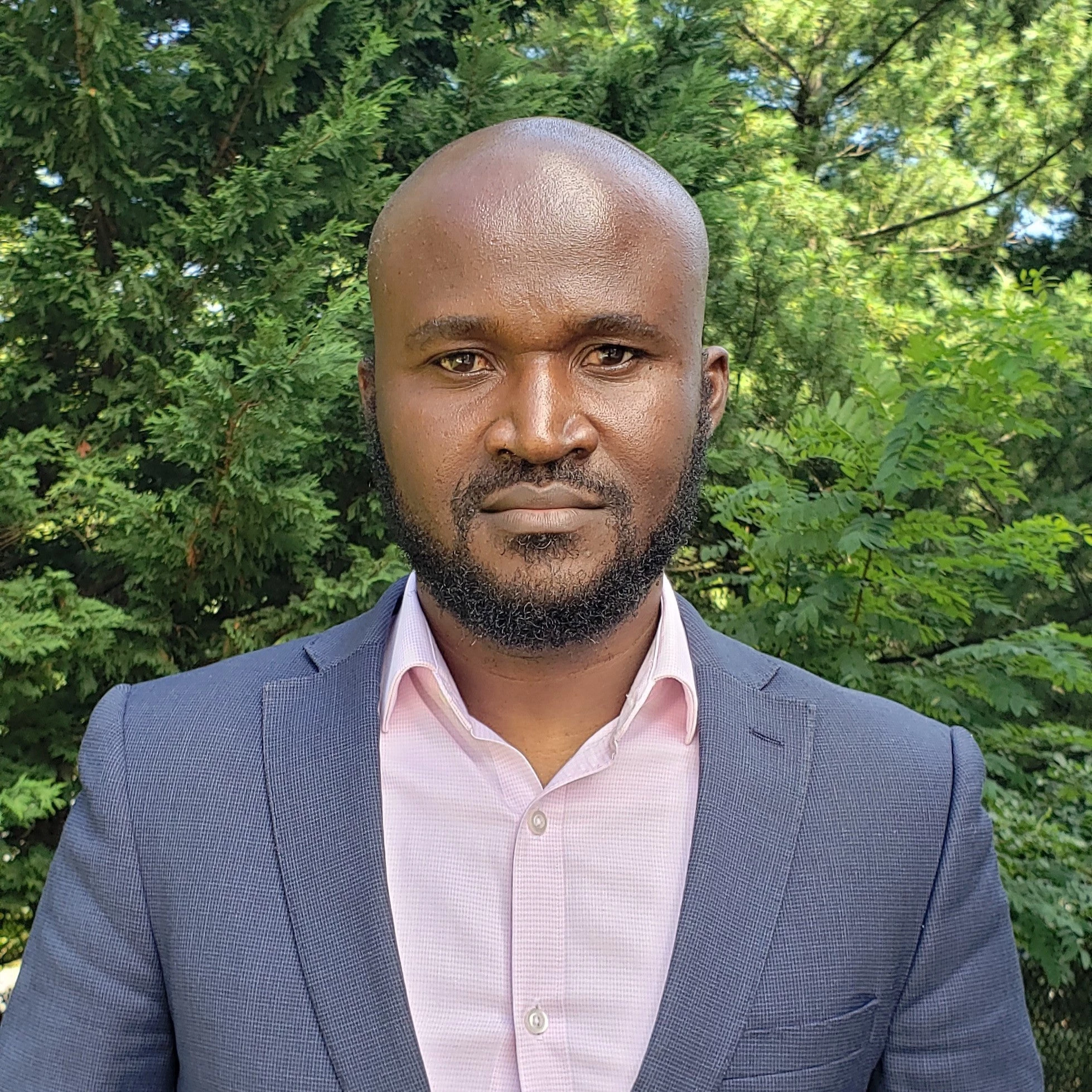
Economist, Living Standards Measurement Study (LSMS), World Bank
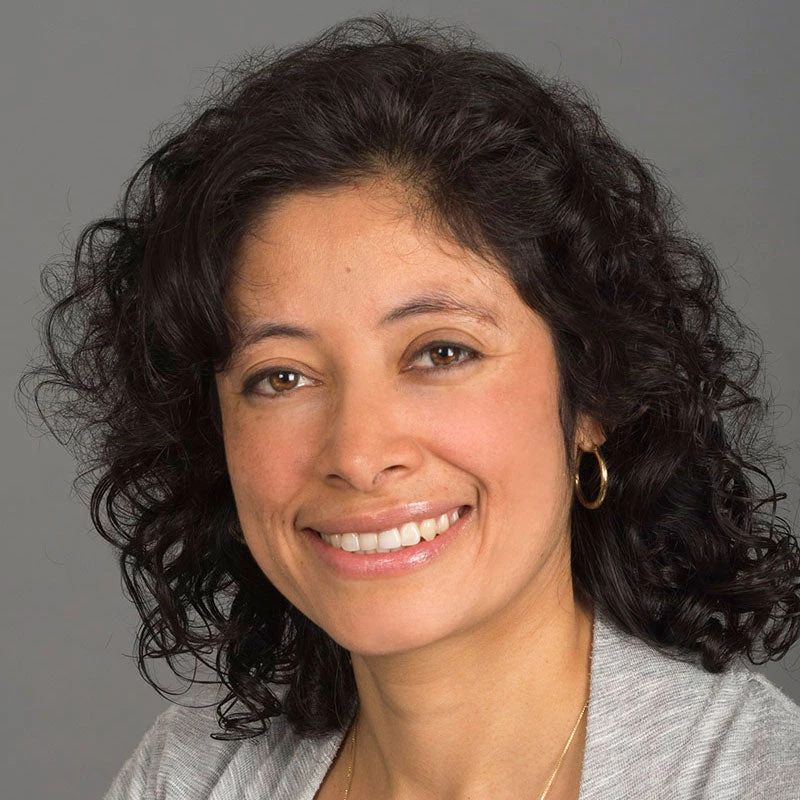
Senior Economist, Living Standards Measurement Study (LSMS), World Bank

Consultant, Living Standards Measurement Study (LSMS), World Bank
Join the Conversation
- Share on mail
- comments added
- Mon - Fri : 08:00 - 16:30
- [email protected]

Search form
Upcoming events.
There is no upcoming events.
- P.O. BOX 38486, Dar es Salaam
- (+255) 782 317 434
Revamp In The Tanzania Education Sector

In an increasingly interconnected world, education policies may emphasize the development of global competence, including intercultural understanding, language proficiency, and awareness of global issues. This could involve integrating global perspectives into the curriculum, promoting international exchange programs, and providing professional development for educators in the sector.
The 2023 Education and Training Policy took three years to develop, and the review with more focus on the Education and Training Policy of 2014, this was revealed by Atupele Mwambene, Director of Policy and Planning at the Ministry of Education, Science and Technology during the Policy Forum Xspaces Policy Dialogue.
The 2023 Education and Training Policy has placed greater emphasis on developing skills that are relevant to the changing job market, such as critical thinking, problem-solving, communication, and digital literacy.
The Director of Policy further highlighted changes in curriculum design, assessment methods, and professional development for teachers by stating the areas revised in the new education policy include teacher’s education, higher learning education, skills-based curricula, and research.
Furthermore, Martha Makala, the Acting National Coordinator at TENMET, highlighted that the education policy has emphasized addressing inequities in access to quality education. The aim is to ensure that every student, irrespective of their background or situation, has the chance to thrive. This endeavour may include measures to mitigate funding gaps, enhance assistance for marginalized communities, and advocate for inclusive teaching methods. Makala emphasized that education initiatives have reached 99.7% of wards nationwide, focusing on teacher training to enhance the implementation of the new curriculum.
Nonetheless, the integration of technology into teaching and learning processes is key. Charles Mwambene, the Data Manager at Shule Direct, emphasized that technology has facilitated access to educational content for students who lack textbooks in schools.
He further elaborated that there should be initiatives to provide better access to digital resources, training for educators on using technology effectively, and policies to ensure equitable access to technology for all students.
The Director of Policy underscored that the enhanced new Education Curriculum addresses the issue of students repeatedly covering the same material, thereby enhancing efficiency. The selection of specific classes to implement the new Education Curriculum is grounded in research findings and aligns with sectoral objectives. Notably, sixth-grade students will undergo assessments instead of exams to attain certificates, departing from previous practices.
Significantly, Ms. Makala emphasized that despite the initiatives done by the government to promote the policy, the community still lacks an understanding of the revised education policy and stating a need to continue educating the community to dispel misconceptions.
- Breakfast Debate
- Transparency
Forthcoming Events
There is no upcoming event yet.
Tanzania Constitutional Review
Constitutional Review resources can be accessed here
Mkukuta Review
Mkukuta Review Docs can be accessed here:
To go directly to the Social Accountability Monitoring page, click here
Kutoka Twitter

- High contrast
- Our mandate
- Our partners
- Our Representative
- Press centre

Search UNICEF
Education has played a vital role in tanzania’s development since independence..

Realizing the right to learn, Tanzania has significantly expanded school enrolment in recent years, especially among girls. However, 3.2 million children aged 7–17 are out of school, of which 1.2 million have never attended. The net secondary enrolment rate is only 27%. Rural and poor girls are the most affected with higher dropout rates from age 12 onwards due to inadequate WASH facilities, menstruation, and child marriage, although a new policy for school re-entry is expected to help. The expansion of primary and secondary enrolment has taken a toll on quality, with higher student to teacher ratios not all children and adolescents who go to school achieve the learning benchmarks expected for their age and grade. Adolescent girls and boys in Tanzania must be prepared for the future of work with many lacking the skills they need for personal empowerment, civic engagement, and productive roles in the economy of the future.
UNICEF in action
UNICEF aims to ensure that all children and adolescents, especially the most vulnerable, have access to quality education in safe environments. The focus is on reaching children in and out of school, with particular attention to adolescent girls. UNICEF advocates for increased funding and resources for education and support the use of data for decision-making. UNICEF addresses negative social norms, such as gender inequality and violence, by strengthening connections between education and other sectors. Promoting disaster preparedness, sustainable energy, and climate integration in schools, UNICEF increasingly embraces digital and distance learning methods to ensure continuous and accelerated learning, drawing from lessons learned during the COVID-19 pandemic.
Tanzania Budget Issue Papers 2022

Tanzania life skills assessment
Life skills finding report 2018
Mapping of school capacity to absorb out-of-school children
A review of school capacity , school inclusiveness, and reasons why children are out of school
Measuring Early Learning and Quality Outcomes (MELQO)

Education Budget Brief 2018

Tanzania country report
Global Initiative on Out-of-School Children

Tanzania Verification of the Out-of-School Children Study
Related news and stories.

The passion to transform the lives of out-of-school children
Mohamed's Journey to Educate Zanzibar’s Most Vulnerable

Tausi's journey to accessing clean water

Anastahili's path to empowerment
A result of skills, entrepreneurship, and endless determination

Empowering teachers, impacting futures
Elevating the standards of learning
Numbers, Facts and Trends Shaping Your World
Read our research on:
Full Topic List
Regions & Countries
- Publications
- Our Methods
- Short Reads
- Tools & Resources
Read Our Research On:
Race and LGBTQ Issues in K-12 Schools
What teachers, teens and the u.s. public say about current curriculum debates, table of contents.
- What do teachers think students should learn about slavery and gender identity?
- Should parents be able to opt their children out of learning about certain topics?
- How often do topics related to race and LGBTQ issues come up in the classroom?
- How do teachers’ views differ by party?
- What teachers think students should learn about slavery and gender identity
- Should parents be able to opt their children out of learning about race and LGBTQ issues?
- Influence over curriculum
- What teens want to learn about slavery
- What teens want to learn about gender identity
- 4. Public views on parents opting their children out of learning about race and LGBTQ issues
- Acknowledgments
- Teacher survey methodology
- Teen survey methodology
- General public survey methodology
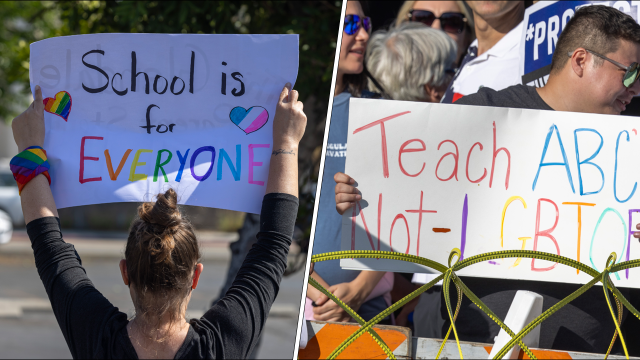
Pew Research Center conducted this study to better understand how public K-12 teachers, teens and the American public see topics related to race, sexual orientation and gender identity playing out in the classroom.
The bulk of the analysis in this report is based on an online survey of 2,531 U.S. public K-12 teachers conducted from Oct. 17 to Nov. 14, 2023. The teachers surveyed are members of RAND’s American Teacher Panel, a nationally representative panel of public school K-12 teachers recruited through MDR Education. Survey data is weighted to state and national teacher characteristics to account for differences in sampling and response to ensure they are representative of the target population.
For the questions for the general public, we surveyed 5,029 U.S. adults from Nov. 9 to Nov. 16, 2023. The adults surveyed are members of the Ipsos KnowledgePanel, a nationally representative online survey panel. Panel members are randomly recruited through probability-based sampling, and households are provided with access to the Internet and hardware if needed. To ensure that the results of this survey reflect a balanced cross section of the nation, the data is weighted to match the U.S. adult population by gender, age, education, race and ethnicity and other categories.
For questions for teens, we conducted an online survey of 1,453 U.S. teens from Sept. 26 to Oct. 23, 2023, through Ipsos. Ipsos recruited the teens via their parents, who were part of its KnowledgePanel. The survey was weighted to be representative of U.S. teens ages 13 to 17 who live with their parents by age, gender, race and ethnicity, household income, and other categories. The survey on teens was reviewed and approved by an external institutional review board (IRB), Advarra, an independent committee of experts specializing in helping to protect the rights of research participants.
Here are the questions used for this report , along with responses, and the survey methodology .
Throughout the report, references to White, Black and Asian adults include those who are not Hispanic and identify as only one race. Hispanics are of any race. The views and experiences of teachers and teens who are Asian American or part of other racial and ethnic groups are not analyzed separately in this report due to sample limitations. Data for these groups is incorporated into the general population figures throughout the report.
All references to party affiliation include those who lean toward that party. Republicans include those who identify as Republicans and those who say they lean toward the Republican Party. Democrats include those who identify as Democrats and those who say they lean toward the Democratic Party.
Political leaning of school districts is based on whether the majority of those residing in the school district voted for Republican Donald Trump or Democrat Joe Biden in the 2020 presidential election.
Amid national debates about what schools are teaching , we asked public K-12 teachers, teens and the American public how they see topics related to race, sexual orientation and gender identity playing out in the classroom.
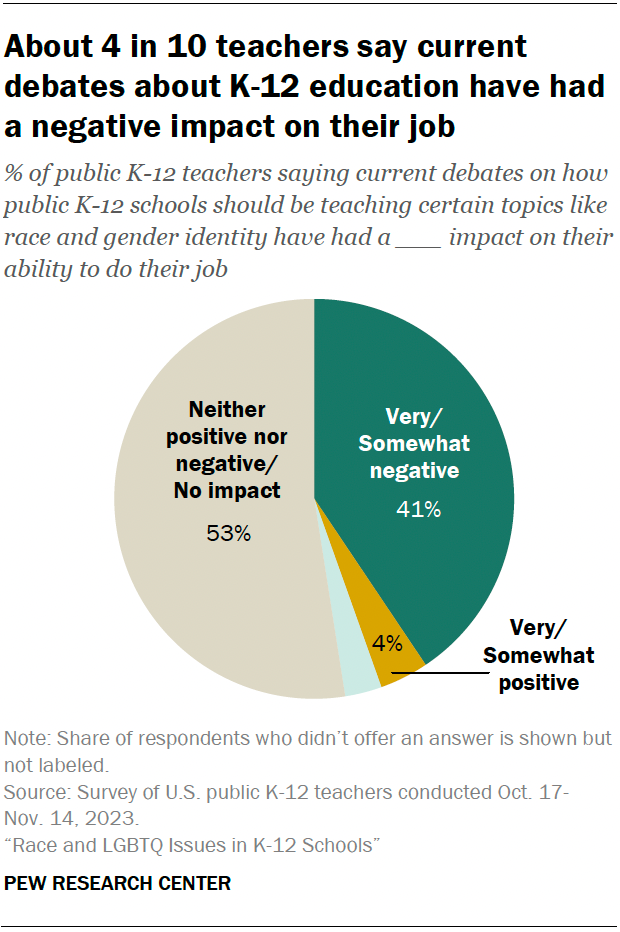
A sizeable share of teachers (41%) say these debates have had a negative impact on their ability to do their job. Just 4% say these debates have had a positive impact, while 53% say the impact has been neither positive nor negative or that these debates have had no impact.
And 71% of teachers say teachers themselves don’t have enough influence over what’s taught in public schools in their area.
In turn, a majority of teachers (58%) say their state government has too much influence over this. And more say the federal government, the local school board and parents have too much influence than say they don’t have enough.
Most of the findings in this report come from a survey of 2,531 U.S. public K-12 teachers conducted Oct. 17-Nov. 14, 2023, using the RAND American Teacher Panel. 1 The survey looks at teachers’ views on:
- Race and LGBTQ issues in the classroom ( Chapter 1 )
- Current debates over what schools should be teaching and the role of key groups ( Chapter 2 )
It follows a fall 2022 survey of K-12 parents that explored similar topics.
This report also includes some findings from a survey of U.S. teens ages 13 to 17 ( Chapter 3 ) and a survey of U.S. adults ( Chapter 4 ). For details about these surveys, refer to the Methodology section of this report. Among the key findings:
- 38% of teens say they feel comfortable when topics related to racism or racial inequality come up in class (among those who say these topics have come up). A smaller share (29%) say they feel comfortable when topics related to sexual orientation or gender identity come up.
- Among the American public , more say parents should be able to opt their children out of learning about LGBTQ issues than say the same about topics related to race (54% vs. 34%).
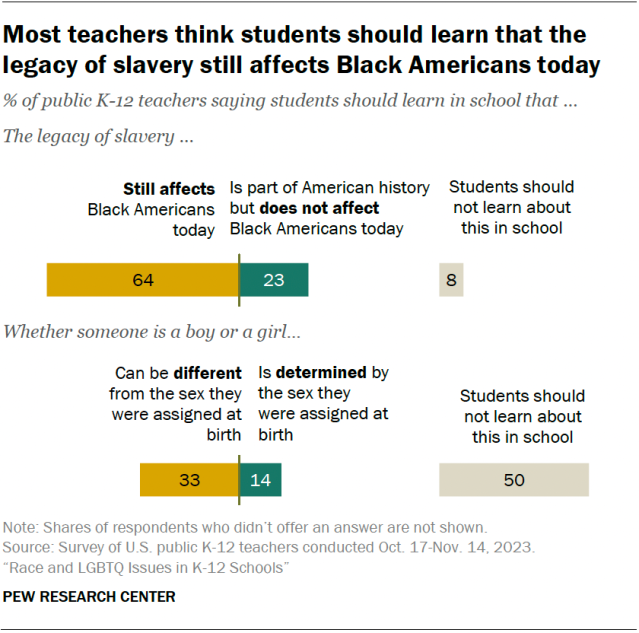
We asked public K-12 teachers what they think students should learn in school about two topics in particular:
- Whether the legacy of slavery still affects the position of Black people in American society today.
- Whether a person’s gender can be different from or is determined by their sex at birth.
For these questions, elementary, middle and high school teachers were asked about elementary, middle and high school students, respectively.
The legacy of slavery
Most teachers (64%) say students should learn that the legacy of slavery still affects the position of Black people in American society today.
About a quarter (23%) say students should learn that slavery is part of American history but no longer affects the position of Black people in American society. Just 8% say students shouldn’t learn about this topic in school at all.
Majorities of elementary, middle and high school teachers say students should learn that the legacy of slavery still has an impact on the lives of Black Americans.
Gender identity
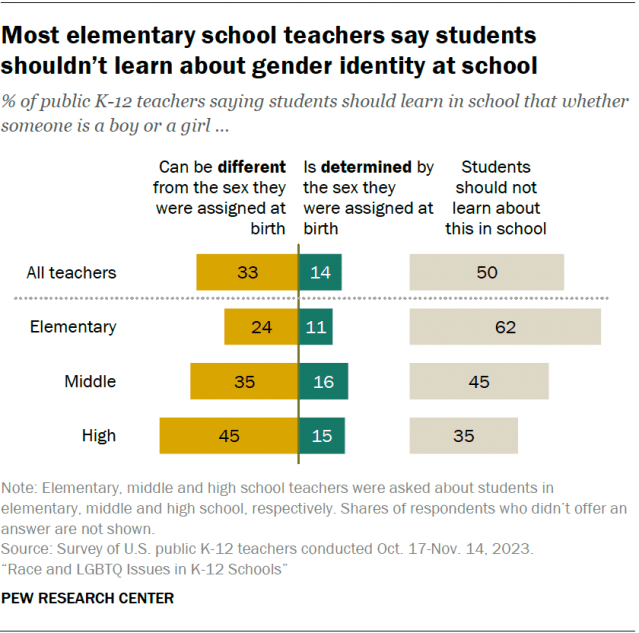
When it comes to teaching about gender identity – specifically whether a person’s gender can be different from or is determined by their sex assigned at birth – half of public K-12 teachers say students shouldn’t learn about this in school.
A third of teachers think students should learn that someone can be a boy or a girl even if that is different from the sex they were assigned at birth.
A smaller share (14%) say students should learn that whether someone is a boy or a girl is determined by their sex at birth.
Views differ among elementary, middle and high school teachers. But teachers across the three levels are more likely to say students should learn that a person’s gender can be different from their sex at birth than to say students should learn gender is determined by sex at birth.
Most elementary school teachers (62%) say students shouldn’t learn about gender identity in school. This is much larger than the shares of middle and high school teachers who say the same (45% and 35%).
What parents and teens say
Parents of K-12 students are more divided on what their children should learn in school about these topics.
In the 2022 survey , 49% of parents said they’d rather their children learn that the legacy of slavery still affects the position of Black people in American society today, while 42% said they’d rather their children learn that slavery no longer affects Black Americans.
When it comes to gender identity, 31% of parents said they’d rather their children learn that gender can be different from sex at birth. An identical share said they would rather their children learn gender is determined by sex at birth. Another 37% of parents said their children shouldn’t learn about gender identity in school.
Teens, like parents, are more divided than teachers on these questions. About half of teens (48%) say they’d rather learn that the legacy of slavery still affects the position of Black Americans today. Four-in-ten would prefer to learn that slavery no longer affects Black Americans.
And teens are about evenly divided when it comes to what they prefer to learn about gender identity. A quarter say they’d rather learn that a person’s gender can be different from their sex at birth; 26% would prefer to learn that gender is determined by sex at birth. About half (48%) say they shouldn’t learn about gender identity in school.
For more on teens’ views about what they prefer to learn in school about each of these topics, read Chapter 3 of this report.
Most public K-12 teachers (60%) say parents should not be able to opt their children out of learning about racism or racial inequality in school, even if the way these topics are taught conflicts with the parents’ beliefs. A quarter say parents should be able to opt their children out of learning about these topics.
In contrast, more say parents should be able to opt their children out of learning about sexual orientation or gender identity (48%) than say parents should not be able to do this (33%).
On topics related to both race and LGBTQ issues, elementary and middle school teachers are more likely than high school teachers to say parents should be able to opt their children out.
How teachers’ views compare with the public’s views
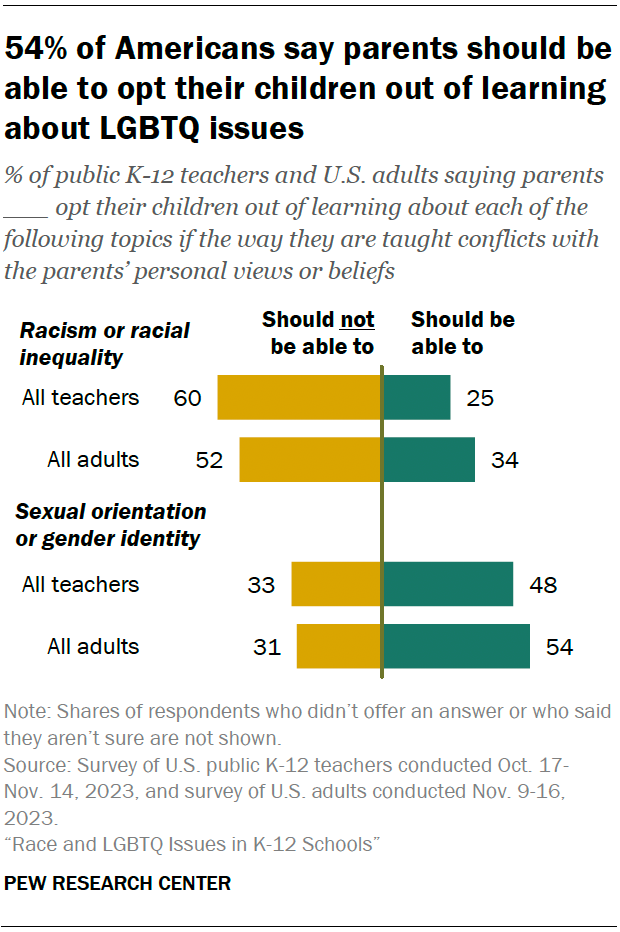
Like teachers, Americans overall are more likely to say parents should be able to opt their children out of learning about sexual orientation or gender identity (54%) than to say they should be able to opt their children out of learning about racism or racial inequality (34%).
Across both issues, Americans overall are somewhat more likely than teachers to say parents should be able to opt their children out.
For more on the public’s views, read Chapter 4 of this report.
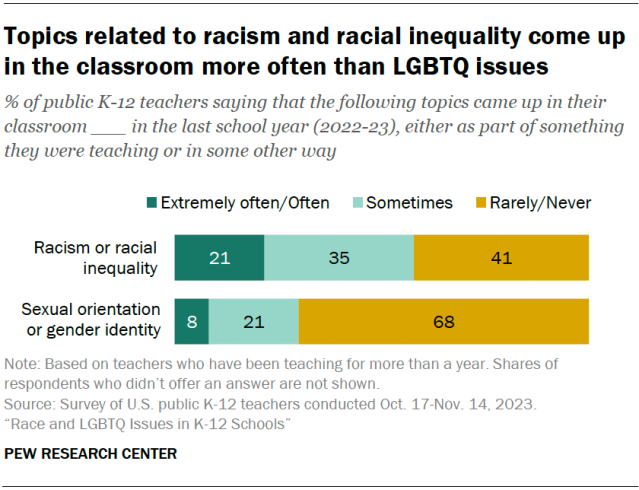
Most teachers who’ve been teaching for more than a year (68%) say the topics of sexual orientation and gender identity rarely or never came up in their classroom in the 2022-23 school year. About one-in-five (21%) say these topics came up sometimes, and 8% say they came up often or extremely often.
Topics related to racism or racial inequality come up more frequently. A majority of teachers (56%) say these topics came up at least sometimes in their classroom, with 21% saying they came up often or extremely often.
These topics are more likely to come up in secondary school than in elementary school classrooms.
As is the case among parents of K-12 students and the general public, teachers’ views on how topics related to race and LGBTQ issues should play out in the classroom differ by political affiliation.
- What students should learn about slavery: 85% of Democratic and Democratic-leaning teachers say students should learn that the legacy of slavery still affects the position of Black people in American society today. This compares with 35% of Republican and Republican-leaning teachers who say the same.
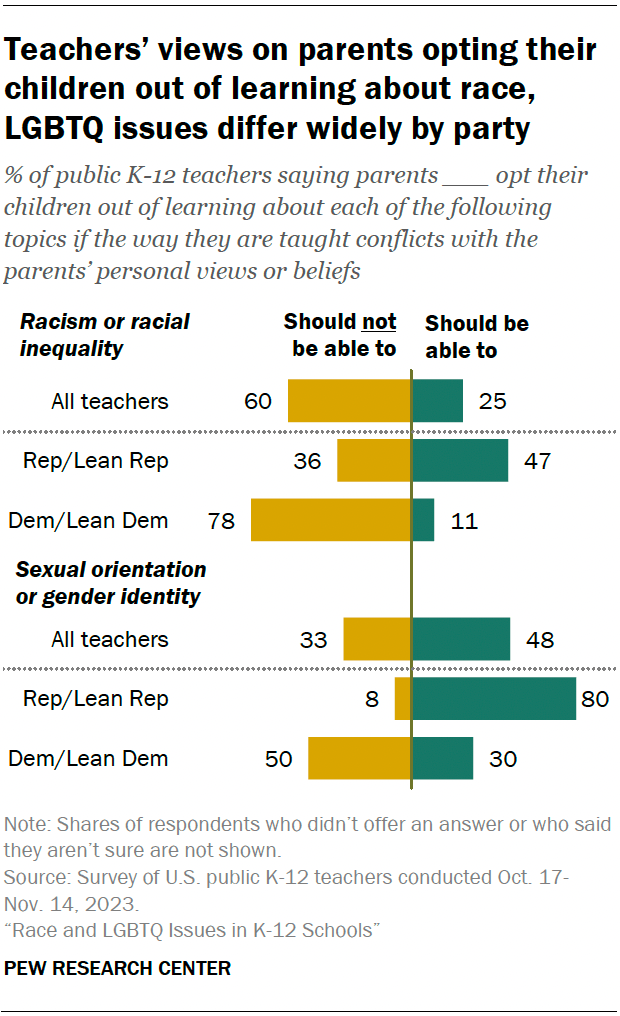
- What students should learn about gender identity: Democratic teachers are far more likely than Republican teachers to say students should learn that a person’s gender can be different from the sex they were assigned at birth (53% vs. 5%). Most Republican teachers (69%) say students shouldn’t learn about gender identity in school.
- Parents opting their children out of learning about these topics: 80% of Republican teachers say parents should be able to opt their children out of learning about LGBTQ issues, compared with 30% of Democratic teachers. And while 47% of Republican teachers say parents should be able to opt their children out of learning about racism and racial inequality, just 11% of Democratic teachers say this.
A majority of public K-12 teachers (58%) identify with or lean toward the Democratic Party. About a third (35%) identify with or lean toward the GOP. Americans overall are more evenly divided: 47% are Democrats or Democratic leaners, and 45% are Republicans or Republican leaners .
- For details, refer to the Methodology section of the report. ↩
Sign up for our weekly newsletter
Fresh data delivery Saturday mornings
Sign up for The Briefing
Weekly updates on the world of news & information
- Education & Gender
- Race & Ethnicity
72% of U.S. high school teachers say cellphone distraction is a major problem in the classroom
U.s. public, private and charter schools in 5 charts, is college worth it, half of latinas say hispanic women’s situation has improved in the past decade and expect more gains, a quarter of u.s. teachers say ai tools do more harm than good in k-12 education, most popular, report materials.
1615 L St. NW, Suite 800 Washington, DC 20036 USA (+1) 202-419-4300 | Main (+1) 202-857-8562 | Fax (+1) 202-419-4372 | Media Inquiries
Research Topics
- Email Newsletters
ABOUT PEW RESEARCH CENTER Pew Research Center is a nonpartisan fact tank that informs the public about the issues, attitudes and trends shaping the world. It conducts public opinion polling, demographic research, media content analysis and other empirical social science research. Pew Research Center does not take policy positions. It is a subsidiary of The Pew Charitable Trusts .
© 2024 Pew Research Center

IMAGES
VIDEO
COMMENTS
Tanzania is one of the Sub-Saharan African countries with low girls' attendance rates, high drop-out rates and poor performance in schools. This is despite global, regional and country measures and interventions to promote girls' right to education. This paper seeks to examine the major international and regional legal provisions for girls' education and assess whether Tanzanian policies ...
education in Tanzania have been addressing curriculum developmentand innovation issues. A focus on curriculum issues iscoreaspects for quality education. Purpose . The major objective of this literature review is to assess the . extent to which education programmes during the Education for self reliance (1968 -1980s) and Poverty reduction (Mid
This study examines the challenges of STEM education in Tanzania and the struggles of science education teachers, curriculum developers, and policy-makers in Tanzania. The research exposes patterns that connect Tanzanian education to external or global aspects of educational reform (e.g., in textbooks, technology, teacher manuals, etc.).
This article establishes the achievements and hurdles of accessing and participating in basic education in Tanzania, covering the period from 2010 to 2019. The basic education in Tanzania comprises pre-primary, primary and ordinary level secondary education. The article reviews and documents trends in access and students' dropout rates, number of teachers and qualified teaching staff ratio ...
In fact, a number of education documents and statements have been directing education policy in Tanzania since independence in 1961. Of particular interest in this paper are the Education for Self-reliance (1967), the Tanzania education system for the 21st century (1993), and Education and Training policy (1995), to mention but a few.
This research report is the result of many individuals. Firstly I thank my Almighty ... In Tanzania distance education was introduced since 1992 by using different instructional materials (Kessy, 2012). In the developed nations, Pethokouk (2002) and Thomas (2001) documented that the
The Education We Want is a report of a critical analysis of the Education and Training Policy (ETP) formulated and adopted by the Government of Tanzania in 2014. The ETP 2014 aimed to guide education provision from pre-primary to tertiary levels along with vocational, non-formal, and special education sectors.
1. Introduction. This review provides an overview of EdTech research in and about Tanzania in order to understand the opportunities for carrying out further research in the country, and how EdTech Hub can collaborate with researchers, practitioners, and policy-makers most effectively.
Tanzania's Vision 2025 aims at achieving high-quality livelihood, peace, stability and unity, good governance, the rule of law, a well-educated and learning society, and a strong and competitive economy. The education sector in Tanzania Mainland is guided by the Education Sector Development Plan 2016/17 - 2020/21 (ESDP). The plan sets the strategic objectives for the education sector, and ...
A REPORT OF THE JOINT EDUCATION SECTOR REVIEW WORKING SESSIONS 18TH - 21ST SEPTEMBER, 2017 TREASURY SQUARE - DODOMA ... Issues and response on basic education issues and priorities in the ... (EdDPG) and Tanzania Education Network (TEN-MET). Statement from Permanent Secretary, MoEST ...
E-mail: [email protected]. Ahadi Anania is a Lecturer at the University of Dar es Salaam School of Education. She has diverse practical experience as a teacher, researcher, and consultant. Her research interests relate to educational leadership, participation in education, and basic education.
Highlights. Education has played a vital role in Tanzania's development since independence. In 2007, the country achieved nearly universal access to primary education. However, since then, enrolment of primary school-aged children has been dropping. Equity and quality pose major challenges.
Highlights. This qualitative study aims to uncover the reasons behind the prevalence of Out-of-School Children (OOSC) in seven regions (Lindi, Dar es Salaam, Tabora, Geita, Mara, Unguja Urban West and North Pemba) in Tanzania. The study was guided by the Conceptual and Methodological Framework (CMF) jointly prepared by UNICEF and UIS (2011 ...
Research for this report was conducted throughout 2016, coinciding with an important year for Tanzania that marks the rollout of free lower-secondary education and greater attention to the ...
UNESCO is supporting efforts to strengthen data collection and management at central, regional, and district levels. This work is key to inform and strengthen the development of gender-responsive education policies and programmes that benefit girls and women in Tanzania. As part of this work, UNESCO provided capacity building trainings to data ...
UNESCO. 19 January 2024. On November 24, 2023, a significant meeting transpired between the Heads of Agencies and Cooperations of the Education Development Partners Group (EdDPG) in Tanzania Mainland and the esteemed Hon. Prof. Adolf Mkenda, Minister for Education, Science and Technology, alongside high-level officials from the Ministry.
SAMSON J. MGAIWA. Abstract. Quality of teachers is recognized as one of the critical dimensions for promoting. student learning in sch ools. However, in Tanzania there are s everal emerging issues ...
Quite a number of publications and research works e.g. Language, Democracy and Education in Africa (Utne, Brock, 2002), Language of Instruction in Tanzanian Higher Education (Gran, L.K. 2007) and Can Three-Tier Language Policy Model work in Tanzania (Rubanza, Y.I. 1996) Rubanza and the majority of Tanzanians argue that Kiswahili, by all means ...
The latest waves (4th and 5th) of the NPS conducted in 2014/15 and 2020/21 contain detailed information on different aspects of education, including literacy, enrollment, and drop-out rates. Results from the NPS show an increase in enrollment and literacy rates in Tanzania, coupled with reduced barriers to children's access to school across ...
of the Education Act of 1978 legalizes the us e of corporal punishment as a way of mana ging behavior o f students and the problem of indisc ipline in schools (Newell, 2011).
Education in Tanzania is an important issue that has received increased attention over the past few years. However, while the country has made significant progress in expanding access to education in recent decades, there are still significant challenges to ensuring that all children have access to quality education.One of the critical challenges facing Tanzania's education system is the ...
The 2023 Education and Training Policy has placed greater emphasis on developing skills that are relevant to the changing job market, such as critical thinking, problem-solving, communication, and digital literacy. The Director of Policy further highlighted changes in curriculum design, assessment methods, and professional development for ...
UNICEF aims to ensure that all children and adolescents, especially the most vulnerable, have access to quality education in safe environments. The focus is on reaching children in and out of school, with particular attention to adolescent girls. UNICEF advocates for increased funding and resources for education and support the use of data for ...
The bulk of the analysis in this report is based on an online survey of 2,531 U.S. public K-12 teachers conducted from Oct. 17 to Nov. 14, 2023. The teachers surveyed are members of RAND's American Teacher Panel, a nationally representative panel of public school K-12 teachers recruited through MDR Education.
seedco holdings limited analyst briefing seedco holdings limited analyst briefing